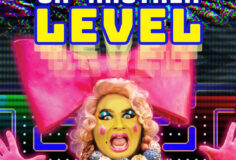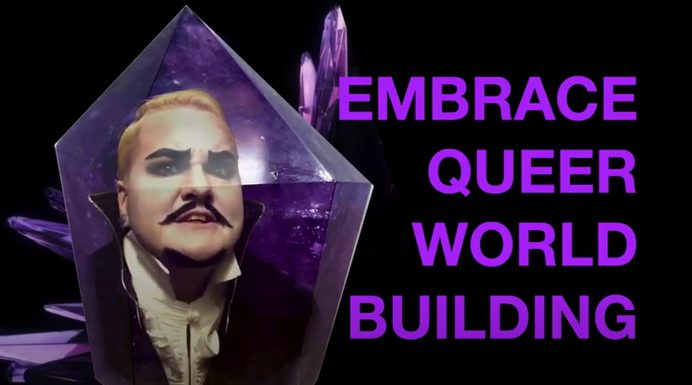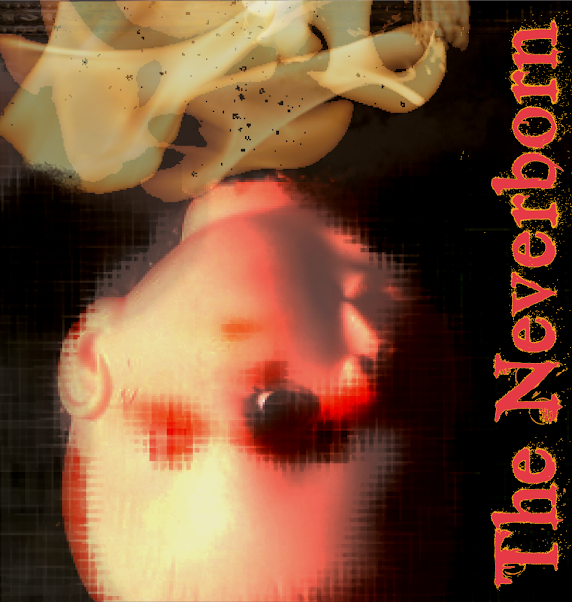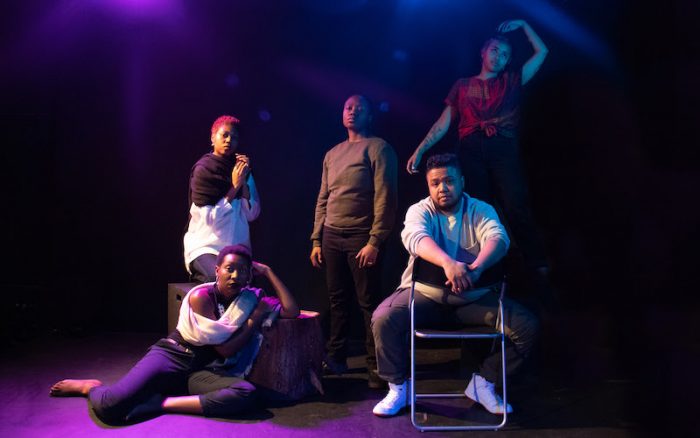
Brandon J. Simmons wrote and directed the very topical comedy “Is She Dead Yet?” which runs at the Annex Theatre from July 31 thru Aug 22, 2015
The upcoming play at Annex punches straight at “white privilege” and “white supremacy”! It is about as topical as you can get!
Is She Dead Yet? is by Brandon J. Simmons, a local actor/playwright who identifies as: male, queer and mixed race. Why is that important? Because, as you will see shortly, he feels like he has a unique experience to share and from which to create this play.
The play is somewhat based on Alcestis, the Euripides play, about a man (a king of course) who is about to die. The Fates (Greek, of course) would allow him to live if he found a substitute, but no one willing wants to die instead of him, until his wife substitutes herself so that her children won’t be fatherless and so she won’t live without her lover.
In Brandon’s comedy (it is a COMEDY, folks, Brandon wants you to know), the “last black woman” offers herself as a sacrifice, but when she’s dead, that leaves the whole rest of the world white. The meaning of life starts to break down. What happens to privilege when there is no one to oppress?
Brandon says, “My play is an adaptation, but it’s just based on it. Alcestis is different and doesn’t deal with race at all. But the plot is essentially identical. It’s very faithful, except the subject matter. This character enters here, this character leaves, this character goes to the underworld.
“What interested me about Alcestis was: why would this woman sacrifice herself for her husband, who is completely lacking awareness about his place in this world? He then seems to completely forget that they arranged this sacrifice and accuses her of abandoning him. For me, Alcestis is a play about a man that doesn’t understand his privilege and that translated, for me, directly into white privilege and white fragility.”
Brandon’s racial heritage is, he says, the same as Obama’s: he has a black father. He says that his experience in the world is different even than other siblings. His skin color is so lightly pigmented brown that many people all his life never knew he was “mixed race.”
He says, “My father, like Eric Garner, also has four children. Eric Garner’s death really hit me that those children lost their father. Trayvon Martin looks like my brother.
“It’s not just skin tone. It’s about class. I am privileged because at a young age, I chose to create a white life for myself. Not all of my siblings made that choice.
“So often when we talk about race we talk about class. At a young age, I saw a white American middle class mostly from television and neighbors. We went to a poor church run by middle class white people. I identified about the world that I was not going to talk live or dress like a working class person. Later I chose “artist” and folded that into it. I can do that because I’m light-skinned.
“A dark skinned black man doesn’t have that privilege. I know that I will never be shot by police because of the perception of my skin color. It’s not available to others who can’t do that from the darkness of their skin.
“I can have it both ways. I can blacken up and lighten up. I could have dressed differently and talked differently, I would be perceived as a black man.
“Rachel Dolezal could have it both ways. That’s why I didn’t tolerate any criticism of her because we both have that privilege. People condemned her because she had two white parents, but Rachel and I both can have it both ways. Dark-skinned and white-skinned people don’t understand how to be on the edge of that.”
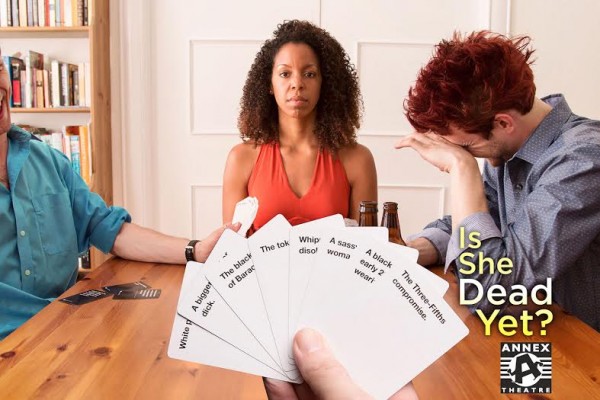
“Is She Dead Yet?” runs July 31 – Aug 22, 2015 at the Annex Theater on Capitol Hill. Photo by Ian Johnston/Dangerpants Photography
The play didn’t start out as a play about “whiteness.” Brandon says, “It wasn’t until the events of last summer, Eric Garner, Michael Brown, the recent Confederate flag issue (began to influence the play).
“’Whiteness’ is fragile itself. It’s such a flimsy idea and flimsy identity that it can’t tolerate being defined. The moment you point out ‘whiteness,’ it shrivels up, and can’t survive the light of day. There isn’t a description of whiteness. It’s not a positive expression of identity.
“As a black man, I can express a positive empowering aspect of blackness. As an expression of who I am. Being a person who can ‘pass,’ I can experience it at arms’ length, kind of dispassionately. I’m able to observe without fear, which (most) black people can’t do. Because I have been accepted as a white person my whole life, I can observe it more like a social scientist.
“And whiteness is unique in that sense. Even maleness, in men who have done plenty of oppressing of women, can have a joy in expressing masculinity.
“That’s why I’ve written a comedy. I don’t want people to walk into a theater and experience white guilt or shame, but I’m interesting in absurdity and exposing the insanity and absurdity of whiteness. It’s extremely funny! It can also be good for a white audience, who has been feeling a sense of guilt over the recent news, to laugh at it and experience a measure of freedom. I think this is what theater can provide in these tricky circumstances.”
Brandon describes the range of humor infused into the play. He says, “South Park inappropriate, highbrow, lowbrow humor. It vacillates wildly (all the way) to dumb gags. That reflects Euripides as well.”
The press release description says, “America is a world in which the whites are immortal, where Death itself is running for high political office, and where there is always an abundance of pink cake. The play blends ancient archetypes with modern anxieties, classic plotting with absurdist touches, and ultimately pits privilege against necessity, in a comic death match that reveals the absurdity and collective insanity of American whiteness.”
And what would he like an audience to walk away feeling? “I would like an audience to walk away not knowing any more than they knew going in, but in a certain confusion or sense of vertigo of theater that really challenges and works on you on a different level. I want to show someone a way to break open a part of our understanding of whiteness that is atrophied.
“It’s a destabilizing comedy. Very Euripidian. His plays, all the great Greek plays, do a kind of deep work, cathartic work. I want people to feel very much alive and a little confused, to be really honest!”
If you are intrigued and ready to laugh while you confront some of the more difficult societal discussions, you can find more information at www.annextheatre.org.
Is She Dead Yet? performs July 31st through August 22nd, Thursdays, Fridays, and Saturdays at 8pm. Tickets are $5-$20. All Thursdays Pay-What-You-Can.
Annex is also hosting lectures exploring the themes of the play with community guests leading each lecture.
Lecture Series Schedule:
Location: Vermillion Art Gallery and Bar (right next door to Annex Theatre on 11th between Pike and Pine)
Thursday August 6th at 7PM: Kathy Hsieh
Friday August 14th at 7PM: Robin DiAngelo
Thursday August 20th at 7PM: Laura Chrisman



